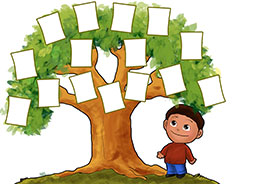Understanding Your Family Tree to Find Your Own Path
The family tree is a tool I employ as a psychologist when working with many clients. Why? Exploring the family tree is a conscious decision to be aware of one’s heritage. Understanding that helps clients see the roots of their belief system and various issues. With a willingness to change, clients can overcome limiting patterns in order to better fulfill their life’s purpose.
 The process reveals ideas and baggage from the family. Since we all want to belong, we tend to repeat these beliefs and patterns. This happens through various processes, such as simple repetition (what I see, I repeat), interpretation (regardless of what I saw during my childhood, my unconscious made an interpretation and created something similar in my current life), opposition (I felt guilty or neglected, so decided to become the opposite of what my family represented) or compensation (I must achieve all that they cannot/did not).
The process reveals ideas and baggage from the family. Since we all want to belong, we tend to repeat these beliefs and patterns. This happens through various processes, such as simple repetition (what I see, I repeat), interpretation (regardless of what I saw during my childhood, my unconscious made an interpretation and created something similar in my current life), opposition (I felt guilty or neglected, so decided to become the opposite of what my family represented) or compensation (I must achieve all that they cannot/did not).
The family tree begins by looking back at the grandparents as the emotional context of childhood for a client’s parents. The couple that brings a child into the world clearly has a major role in emotional development. Parental influence sets the stage for creativity and sexuality. Siblings are the first people with which a client shares things (space, food, toys, attention) which informs a lot of potentially lifelong beliefs and behaviors.
I serve as an “awareness consultant”, working with clients as a team through the process of:
- 1. Being aware
The study of the family tree uncovers all the unconscious dynamics that drive one’s life, creating distance from living authentically. I help clients gain daily awareness of these dynamics and notice how ingrained patterns direct their perceptions and behaviors. Common behaviors a client might become aware of include frequent complaining, being unnecessarily pessimistic or negative or trying to control situations that can’t really be controlled. They likely never realized before how repeating these behaviors was affecting their life. - 2. Getting rid of limiting patterns/beliefs
Through conscious change, clients work on their inner dialogue and the realization that reality depends on perception. This can help clients not to take things so personally and to adapt to change and face conflicts that are limiting them. We can also use symbolic acts in our sessions to break patterns. The symbolic act goes directly to the unconscious (where the pattern resides) and is an important way to connect with the process of healing. - 3. Building tools to be an emotional adult
Typically, I work with clients for a limited time period. The work we do in those sessions helps clients to be responsible for their own emotions, manage the need to control and find daily peace within. Clients then have all the tools they need within, to live a purposeful life.
Bookmark our blog for great articles such as Bibiana’s upcoming article with real-life examples of clients who have benefitted from family tree and learn more about how you can benefit from this and related techniques!
Bibiana Ruedo-Bueno is a holistic psychologist providing individual and couples therapy at the Hongmei Road, Century Park and Downtown locations of Body & Soul – Medical Clinics. She combines clinical psychology, psycho genealogy (family tree) and alternative techniques for a customized approach to treating patients. If you are suffering from anxiety, depression, difficulty adjusting to life in Shanghai, relationship issues or simply wish to build a healthy, fulfilled life, make an appointment for a consultation with Bibiana.
